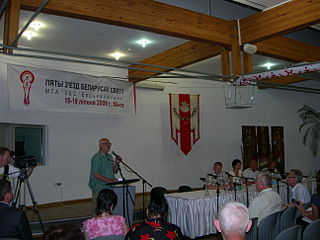Africa
| | This section is empty. You can help by adding to it. (January 2013) |
Heal The World Movement Nigeria
This is a list of notable active non-governmental organizations of national minorities, indigenous and diasporas.
| | This section is empty. You can help by adding to it. (January 2013) |
Heal The World Movement Nigeria

Lviv is the largest city in western Ukraine, and the sixth-largest in Ukraine, with a population of 717,273. It serves as the administrative centre of Lviv Oblast and Lviv Raion, and is one of the main cultural centres of Ukraine. Lviv also hosts the administration of Lviv urban hromada. It was named in honour of Leo, the eldest son of Daniel, King of Ruthenia.

The Romanian Constitution, under the conditions imposed by the Electoral Law, provides seats in the Chamber of Deputies for the party and cultural association of ethnic minorities in Romania. Minority parties and associations are exempt from the electoral threshold, and are guaranteed a seat so long as they earn at least 10% of the vote that was required for the last party eligible to earn a seat through the threshold.
Minority rights are the normal individual rights as applied to members of racial, ethnic, class, religious, linguistic or gender and sexual minorities, and also the collective rights accorded to any minority group.

The Koliivshchyna was a major haidamaky rebellion that broke out in Right-bank Ukraine in June 1768, caused by money sent by Russia to Ukraine to pay for the locals fighting the Bar Confederation, the dissatisfaction of the peasants with the treatment of Eastern Catholics and Orthodox Christians by the Bar Confederation and the threat of serfdom and by hostility to the Polonized local Ruthenian nobility and to ethnic Poles by the Cossacks and the peasants. The uprising was accompanied by pogroms against both real and imagined supporters of the Bar Confederation, particularly ethnic Poles, Jews, Roman Catholics, and especially Byzantine Catholic priests and lairy. This culminated in the massacre of Uman. The number of victims is estimated from 100,000 to 200,000, because many communities of national minorities completely disappeared in the areas devastated by the uprising.
About 9.3% of Romania's population is represented by minorities, and 13% unknown or undisclosed according to 2021 census. The principal minorities in Romania are Hungarians and Romani people, with a declining German population and smaller numbers of Poles in Bukovina, Serbs, Croats, Slovaks and Banat Bulgarians, Ukrainians, Greeks, Jews, Turks and Tatars, Armenians, Russians, Afro-Romanians, and others.

Anti-Bolshevik Bloc of Nations (ABN) was an international anti-communist organization founded as a coordinating center for anti-communist and nationalist émigré political organizations from Soviet and other socialist countries. The ABN formation dates back to a conference of representatives of non-Russian peoples that took place in November 1943, near Zhytomyr as the Committee of Subjugated Nations/the Anti-Bolshevik Front on the initiative of the Organization of Ukrainian Nationalists. It dissolved in 1996.

Lviv is an administrative center in western Ukraine with more than a millennium of history as a settlement, and over seven centuries as a city. Prior to the creation of the modern state of Ukraine, Lviv had been part of numerous states and empires, including, under the name Lwów, Poland and later the Polish–Lithuanian Commonwealth; under the name Lemberg, the Austrian and later Austro-Hungarian Empires; the short-lived West Ukrainian People's Republic after World War I; Poland again; and the Soviet Union. In addition, both the Swedes and the Ottoman Turks made unsuccessful attempts to conquer the city.
Indigenous people under the nation-state have experienced exclusion and dispossession. With the rise in globalization, material advantages for indigenous populations have diminished. At times, national governments have negotiated natural resources without taking into account whether or not these resources exist on indigenous lands. In this sense for many indigenous populations, the effects of globalization mirror the effects of the conquest in the mid 16th century.
Ukrainian World Congress is a non-profit organization, nonpartisan association, international coordination assembly of all Ukrainian public organizations in diaspora.

The Belarusian diaspora refers to emigrants from the territory of Belarus as well as to their descendants.
The European Music Council (EMC) is a regional group of the International Music Council (IMC) representing Europe. It was established in 1972 as the 'European regional group of the IMC' and was renamed the European Music Council in 1992. The IMC was founded by UNESCO in 1949, and is, today, a non-governmental organisation (NGO), which still retains formal relations with UNESCO. Until 2000 the secretariat was based in Aarau, Switzerland, and is now in Bonn, Germany.